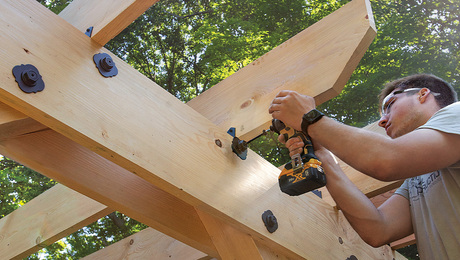I’ve been using metal studs for years for basements.Not sure anymore which is better wood or 20 gauge metal studs. What do you guys think?
Thanks, Lou

Built from locally sawn hemlock, this functional outdoor feature uses structural screws and metal connectors for fast, sturdy construction.

"I have learned so much thanks to the searchable articles on the FHB website. I can confidently say that I expect to be a life-long subscriber." - M.K.
Get home building tips, offers, and expert advice in your inbox

Dig into cutting-edge approaches and decades of proven solutions with total access to our experts and tradespeople.
Start Free Trial Now
Get instant access to the latest developments in green building, research, and reports from the field.
Start Free Trial Now
Dig into cutting-edge approaches and decades of proven solutions with total access to our experts and tradespeople.
Start Free Trial NowGet instant access to the latest developments in green building, research, and reports from the field.
Start Free Trial Now© 2025 Active Interest Media. All rights reserved.
Fine Homebuilding receives a commission for items purchased through links on this site, including Amazon Associates and other affiliate advertising programs.
Get home building tips, offers, and expert advice in your inbox
Become a member and get instant access to thousands of videos, how-tos, tool reviews, and design features.
Start Your Free TrialGet complete site access to expert advice, how-to videos, Code Check, and more, plus the print magazine.
Already a member? Log in
We use cookies, pixels, script and other tracking technologies to analyze and improve our service, to improve and personalize content, and for advertising to you. We also share information about your use of our site with third-party social media, advertising and analytics partners. You can view our Privacy Policy here and our Terms of Use here.
Replies
I don't know, but in my basement we have wood studs for the perimeter wals and around the stairs, and for deviding/non-structural walls we have metal studs
Ductape can fix EVERYTHING!!!
If it's not load bearing I prefer metal studs anywhere & everywhere, but I do commercial work so metal studs are second nature to me.
The best thing is you never have to look for the "crown".
“The world is a dangerous place, not because of those who do evil, but because of those who look on and do nothing.” —Albert Einstein
Metal studs are great in a basement. The 1 5/8" wide 20 gauge studs are nice for the perimeter. Use an insulation break such as XPS foam under the bottom plate/track so your studs don't stay at the same temperature as the slab.
Billy
Edited 2/24/2008 9:50 pm ET by Billy
on metal....i always run a wood 2x plate first... then the bottom track... i've just always liked have'n something to nail trim to... not the fastest or i'm sure the best way... just what i've always done...
p
See, here's where I'd vote for wood just because I'm familiar with wood, and not metal.
Easy to cut - and I don't just mean to length. You can rip it, bevel it for a 45* corner, easily notch it, and so on. You can hang heavy stuff off it. You can shoot brads into it. None of those little rubber grommets for wires. Normal electrical boxes that you can attach with nails or screws (just my preference).
One interesting thing you can do is combine metal track and wooden studs, to split the difference. I haven't tried that, but a FHB article mentioned it. Given limited space in a basement, the metal track can absorb small variations in stud length due to unevenness in the slab, etc. You can cut all your studs to the same length, set your track, and attach one stud at a time without measuring and cutting each one.
I prefer mostly steel with wood base plates and nailers ... such as around doors and windows.
Jeff
Buck Construction
Artistry In Carpentry
Pittsburgh Pa
It's good to have something to nail to and I should have mentioned that. A little bit of XPS foam helps with the insulation aspect as insurance against ghosting on the studs, and it keeps the ACQ wood away from the galvanized steel. I've used Trex for bottom plates under the steel track too.
Billy
Jeff, we worked both wood and metal into the mix. I was just thinking to myself "maybe we should try wood this time" See how it goes. I think we'll just use 20g.
-Lou
Metal are still better for all the same reasons.
Galvanized, not affected by moisture
Absolutely straight.
Termite proof
Insect proof
Inexpensive
Easy to use
100% recyclable
can be done without electricity
can be cut while on a ladder
You can use 1" drywall screws (2000 more per box)
If I keep going I'll be here all day
Have a good day
Cliffy
Well, if nobody else will, I'll throw in a vote for wood. Here's why:
- wood will absorb some moisture, which is a good thing. Metal studs don't absorb any water, so when the moisture content in the air is high, and the metal studs are colder than the air, you've got liquid in your walls. Liquid water is very, very hard to get out of a closed wall. Wood studs will absorb that moisture from the air and then release it again without the moisture ever becoming "liquid" - water vapor is much easier to pass through walls (as long as there's no vapor barrier and a good HVAC setup).
here's some more good info to help you on your way: http://www.buildingscience.com/documents/digests/bsd-103-understanding-basements/?topic=/systemsapproach/buildingenclosure/foundationassembly/main_topic
Justin Fink - FHB Editorial